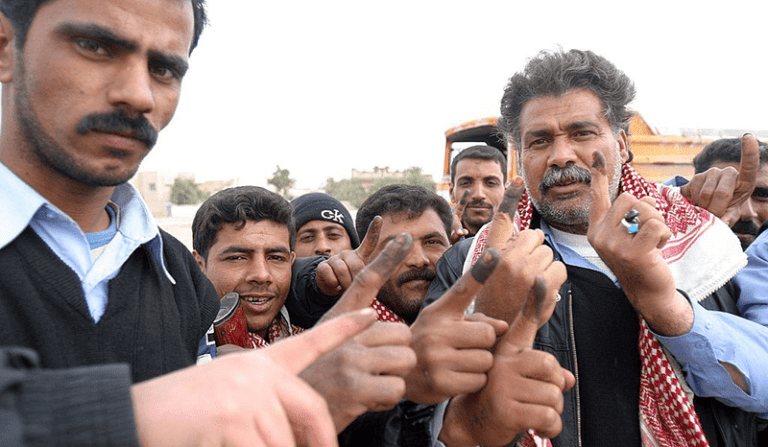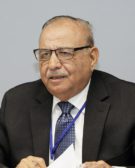
Iraq’s impressive victories against the so-called Islamic State (IS) and expulsion of its fighters from major urban centers do not herald the end of the country’s numerous troubles. Iraq is set to face other political, security, social, and economic challenges. Important milestones this year include holding parliamentary elections for which parties are actively preparing, re-engaging the Kurds, rebuilding destroyed infrastructure and revitalizing the economy, and dealing with sectarian divisions. Regionally, Iraq finds itself in a difficult position as the Syrian war creates unstable dynamics in the Levant, Iran extends its reach, and the Gulf Cooperation Council settles into a permanent crisis.
To understand developments in Iraq at the start of the new year, Dr. Imad K. Harb, Director of Research and Analysis at Arab Center Washington DC (ACW), posed a number of questions to Dr. Abdulwahab al-Qassab, Visiting Analyst at ACW. The following is a translation of the interview.
Imad Harb: Iraqi Prime Minister Haider al-Abadi declared final victory over the so-called Islamic State on Iraqi territory. Do you think that is justified? What are conditions like in the western areas of the country where IS might find shelter?
Abdulwahab al-Qassab: There are a number of issues that should be taken into consideration here, such as IS’s command and control and the countermeasures it might take, the existence of sleeper cells and the extent of popular collaboration with them, and the credibility of Iraq’s military intelligence and information services. Looking at these and other issues prompts one to doubt the veracity of Mr. Abadi’s claims. Terrorist organizations such as the Islamic State depend on flexibility, maneuverability, and the element of surprise, all essential principles of war. One lesson IS learned over the last few years is the inadvisability of holding territory. When IS lost control over such territory, it also lost the admiration of the people who lived there and who then began to see IS as a weak entity not worthy of their support. But as to Mr. Abadi’s claim of victory, it is at least premature, for the final defeat of IS will come only when it is defeated in the Syrian desert to the west.
IH: Iraq is set to hold parliamentary elections later this year. Are there specific trends for political parties and factions? How are alliances being struck and who is allying with whom?
AQ: The political process that the American occupation has established has failed miserably. Many Iraqis do not feel that what they have today is any better than what they had during Saddam Hussein’s rule. What they desired since the occupation are freedom, pluralism, and the peaceful transition of power. What they actually got was a political process that has allowed religious and reactionary parties and chauvinistic Kurdish political organizations to control their lives. Kurdish parties today are busy alienating each other and their supporters and destroying what Kurds had already achieved. Perhaps the worst event was holding an unconstitutional referendum on seceding from Iraq, which backfired. In essence, the Iraqi political process launched after the occupation has helped create a triad of abhorrent sectarianism, widespread corruption, and reactionary ideology and ideas that have taken hold of wide sectors of society.
Successive sectarian-based governments have failed to achieve security and safety for the average citizen and to defend Iraq’s territorial integrity. They allowed ragtag IS fighters to take over almost half of the country’s area in about two weeks. They have also botched their duty of securing proper services and allowed cultural collapse and the rise of previously unknown societal values. These failures have resulted in widespread loss of confidence in politicians whose main interest is enriching themselves and their coteries of supporters.
Looking at the electoral landscape today, we see the leaders of political Islamist Shia parties as well as the Sunni Iraqi Islamic Party beginning to change their discourse to embrace secular government and transparency and declare their opposition to sectarianism and corruption. Some of them have even abandoned their religious parties and established new parties and trends––such as Ammar al-Hakim, who left the Higher Islamic Council that was inaugurated in Tehran during the Iran-Iraq war. He has now started the Wisdom Party. It is thought that Mr. Abadi himself is also contemplating leaving the Daawa Party, to which he has belonged since the 1980s. Truth is, if people were left alone to choose whomever they liked, they would not elect any of the traditional politicians. But religious authorities (marjaiyyat) will not allow that. There is also a serious problem with the absence of a large number of Sunnis displaced during the battles against IS—a condition that is likely to be in the interest of the Iraqi Islamic Party, which has been accused of corruption and collaboration with Iran.
There is a strong secular, cross-sectarian trend in Iraqi society that faces a dual assault from parties benefiting from a sectarian government and from religious authorities, both of which are anathema to liberal forces in society. This, unfortunately, limits the trend’s reach and chances. I believe that it is likely that the general Shia Islamist atmosphere that has prevailed for so long will reproduce itself and continue to dominate government formation. However, there is a chance that a slight change will occur in the fortunes of liberal secularists if they unite under the leadership of former Prime Minister Iyad Alawi.
IH: In the Shia political field, there are those who support Abadi and those who oppose him and are for former Prime Minister Nouri al-Maliki. Or they are neutral. Is this an accurate reflection of the Shia street? What do you think the Shia and other alliances will look like in 2018?
AQ: The Shia are not a monolith. There is the Daawa Party of Abadi and al-Maliki, and it has controlled the government for a long time with the assistance of Shia religious authorities and Iran’s support, in addition to that given by the United States. There is also Alawi’s trend, which is secularist and Arab nationalist in general and is being fought by religious authorities. Finally, there is a strong competitor to Daawa in the Sadrist trend and other smaller competitors like the party of al-Sayyid al-Sarkhi al-Hasani which has an Arab nationalist orientation and was persecuted by the militias of the religious parties.
Generally speaking, Shia public opinion coalesces around the parties publicly and privately, supported by the marjaiyyat under the pretext of defending the faith. There also is Iran’s role in supporting religious parties. Indeed, all big Shia parties exploit voters in the name of protecting the sect. The only way to change this is to end the control by the marjaiyyat on the people.
As for Abadi and Maliki, they are two sides of the same coin represented by the Daawa Party. The difference is that Abadi belongs to the technocratic urban class. He is from Baghdad and comes from a renowned family and studied in the United Kingdom. Al-Maliki, on the other hand, is from a rural area where tradition and religiosity are the norm. Both have a negative view of government and the state and its institutions. In fact, Abadi failed to prosecute al-Maliki for corruption and for his negligence in fighting the Islamic State; this is because of their common background in the party.
IH: Developments in the Kurdish north have serious impact on Iraqi affairs, notwithstanding Kurdish parties’ separation from Baghdad. How do Kurdish affairs influence the general Iraqi status quo? How will Kurdish parties participate in the next general elections?
AQ: Since independence, Iraq has had to deal with the negative repercussions of treaties dealing with the Kurds after the collapse of the Ottoman Empire. Monarchical Iraq worked to strengthen Iraq’s national identity to include the Kurds. But this process experienced some serious setbacks after the 1958 republican revolution and the 1961 start of a Kurdish revolt declared by the late Mustafa Barzani. Politically, Kurds have suffered from a number of interconnected dilemmas such as the divisions between Irbil-Dohuk-based Barzanis and the Sulaymaniyah-based Talabanis and their associates, outside interference from Turkey and Iran, the position of the Peshmerga, the Kurdish military force, Barzani’s rush to hold a costly referendum on independence from Iraq, and widespread corruption.
Recent protests in Kurdistan have also highlighted a problem of governance that is not easily addressed, given the Kurdistan Regional Government’s political and financial troubles. All of these conditions are most likely to influence how the local and national elections are conducted and who will benefit. It is likely that the traditional parties (the Kurdistan Democratic Party and the Democratic Union of Kurdistan) will suffer losses, especially the latter, which will be upstaged by the Change Movement (Gorran) that broke away from the party a few years ago.
IH: How can the Iraqi government prevent Iraq from becoming an Iranian land bridge to Syria? What could happen to Iran’s influence inside Iraq?
AQ: The current government is incapable of preventing Iran from using the country as a conduit to Syria. Iran has supporters and partisans inside Iraq and indeed has units from its Islamic Revolutionary Guard Corps on Iraqi soil. The commander of the Quds Force, General Qassem Suleimani, operates freely in the country, and Iranian-supported militias in Iraq provide the military and sectarian justification for Iran’s role. Additionally, Shia marjaiyyat in Iraq welcome Iran’s role.
IH: What are the general contours of Iraq’s position toward the GCC crisis?
AQ: Iraq’s stance toward the GCC crisis is confused and confusing. It is actually incapable of having an independent position that reflects strictly Iraqi national interests. The Iraqi government has declared its neutrality in the dispute and its readiness to mediate in it, but it has not been able to translate that on the ground. In the end, the Iraqi government cannot but accommodate Iran’s general policy toward the GCC and other regional issues.


